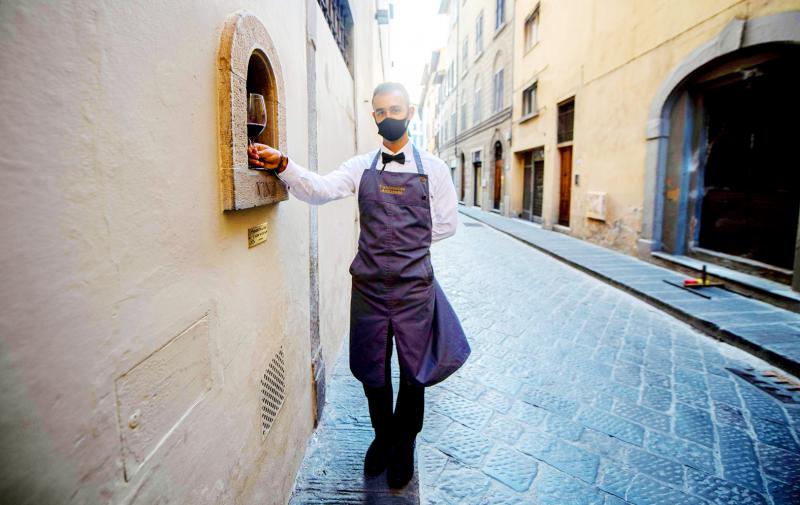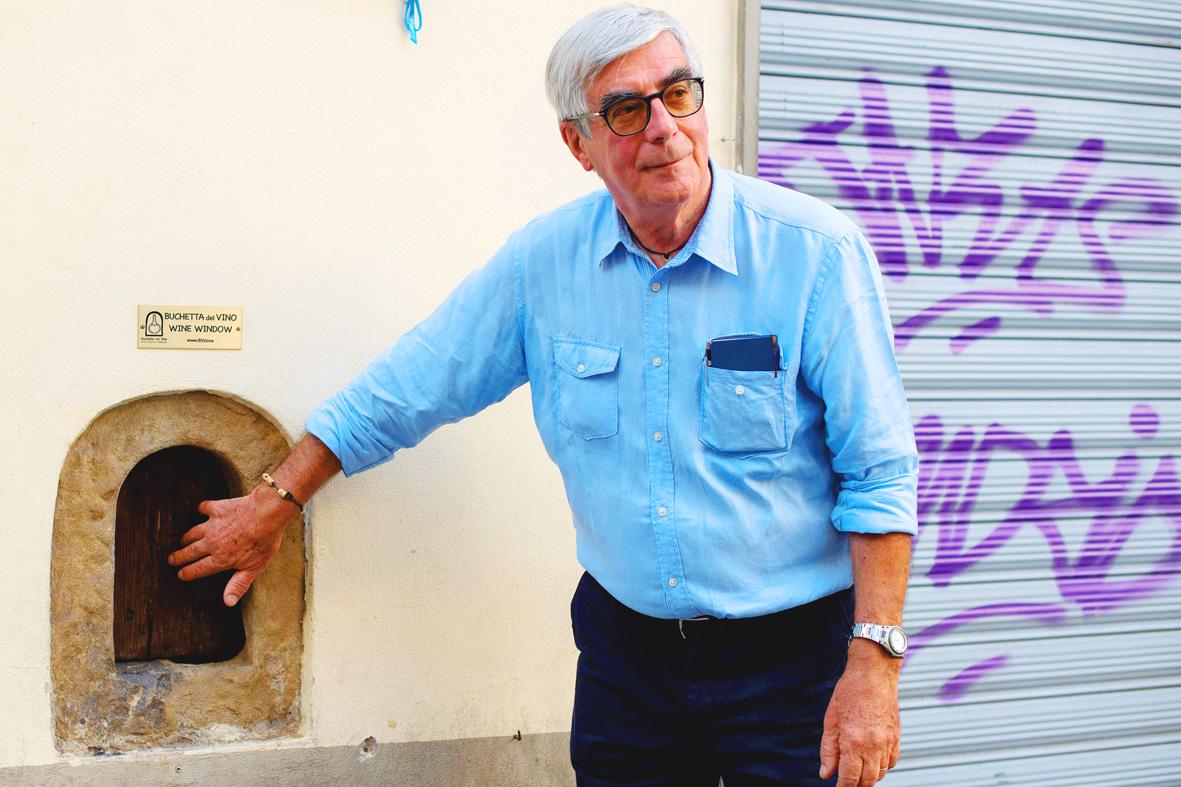As 16th-century Florentines dropped like flies to the plague, survivors drowned their fears in wine, passed to them through small windows which are enjoying a renaissance during the COVID-19 era.
The small “wine windows” can be seen dotted around the Tuscan capital next to the grand entrances of sumptuous noble palaces, where wealthy families used to sell alcohol directly to thirsty customers, passing flasks through to eager hands.
Over time, the apertures, just 30cm high and 20cm wide, fell into disuse.

Photo: AFP
However, the COVID-19 pandemic has seen their resurgence, with bars using them to serve ice-cold cocktails, such as Aperol Spritz, gelato or coffee.
They offer a way for establishments hit hard by the lockdown to attract customers while adhering to social distancing rules.
The windows predate the plague. They were created by the Medici family, after it returned to power in 1532 following the fall of the Florentine Republic, said Massimo Casprini, an academic who has written a book about them.

Photo: AFP
The famed political dynasty “wanted to promote agriculture, so encouraged large Florentine landowners to invest in olive groves and vineyards ... while giving them tax breaks to sell their production directly in town,” he said.
The landowners were only allowed to sell wine they had produced themselves, and only 1.4 liters at a time, but it got rid of the intermediaries.
“Common people could buy wine at a more reasonable price than from the shopkeepers,” Casprini said.
That could translate into big savings, for “at the time wine consumption was enormous,” he said, with a grin.
It also had another unexpected benefit: ensuring social distancing.
“The window was closed with a wooden panel, the customer would knock with the knocker, and the wine merchant inside would take the empty bottle and fill it,” Casprini said. “That meant no direct contact.”
To date, some 267 of the wine windows have been rediscovered in Tuscany, with 149 of them in the center of Florence.
“There were many more,” Casprini said. “Almost every landowner had one, but many of them were destroyed, particularly during the World War II bombings.”
Others have been walled up, but can still be spotted by their distinctive frames in gray sandstone, or stone dug from quarries in the nearby picturesque town of Fiesole.
Over the centuries, some lucky drinkers have struck red gold: One French guide to Florence from 1982 points its readers toward a window serving vintage wine from the world-famous Frescobaldi estate.
An association called Le buchette del vino (“Wine Holes”) now catalogs the windows, placing plaques below each one.
Its Web site provides hole-spotters with an interactive map as well as their history.
Despite being protected by law, Casprini said that three windows “have already disappeared” since his first census in 2005.
Those left are used as everything from quirky hatches in bars or cafes, to shop displays and even small Catholic shrines.

HANDOVER POLICY: Approving the probe means that the new US administration of Donald Trump is likely to have the option to impose trade restrictions on China US President Joe Biden’s administration is set to initiate a trade investigation into Chinese semiconductors in the coming days as part of a push to reduce reliance on a technology that US officials believe poses national security risks. The probe could result in tariffs or other measures to restrict imports on older-model semiconductors and the products containing them, including medical devices, vehicles, smartphones and weaponry, people familiar with the matter said. The investigation examining so-called foundational chips could take months to conclude, meaning that any reaction to the findings would be left to the discretion of US president-elect Donald Trump’s incoming team. Biden

INVESTMENT: Jun Seki, chief strategy officer for Hon Hai’s EV arm, and his team are currently in talks in France with Renault, Nissan’s 36 percent shareholder Hon Hai Precision Industry Co (鴻海精密), the iPhone maker known as Foxconn Technology Group (富士康科技集團) internationally, is in talks with Nissan Motor Co’s biggest shareholder Renault SA about its willingness to sell its shares in the Japanese automaker, the Central News Agency (CNA) said, citing people it did not identify. Nissan and fellow Japanese automaker, Honda Motor Co, are exploring a merger that would create a rival to Toyota Motor Corp in Japan and better position the combined company to face competitive challenges around the world, people familiar with the matter said on Wednesday. However, one potential spanner in the works is

SEMICONDUCTORS: Samsung and Texas Instruments would receive US$4.75 billion and US$1.6 billion respectively to build one chip factory in Utah and two in Texas Samsung Electronics Co and Texas Instruments Inc completed final agreements to get billions of US dollars of government support for new semiconductor plants in the US, cementing a major piece of US President Joe Biden administration’s CHIPS and Science Act initiative. Under binding agreements unveiled Friday, Samsung would get as much as US$4.75 billion in funding, while Texas Instruments stands to receive US$1.6 billion — money that would help them build facilities in Texas and Utah. The final deals mean the chipmakers can begin collecting the funding when their projects hit certain benchmarks. Though the terms of Texas Instruments’ final agreement is

Call it an antidote to fast fashion: Japanese jeans hand-dyed with natural indigo and weaved on a clackety vintage loom, then sold at a premium to global denim connoisseurs. Unlike their mass-produced cousins, the tough garments crafted at the small Momotaro Jeans factory in southwest Japan are designed to be worn for decades, and come with a lifetime repair warranty. On site, Yoshiharu Okamoto gently dips cotton strings into a tub of deep blue liquid, which stains his hands and nails as he repeats the process. The cotton is imported from Zimbabwe, but the natural indigo they use is harvested in Japan —